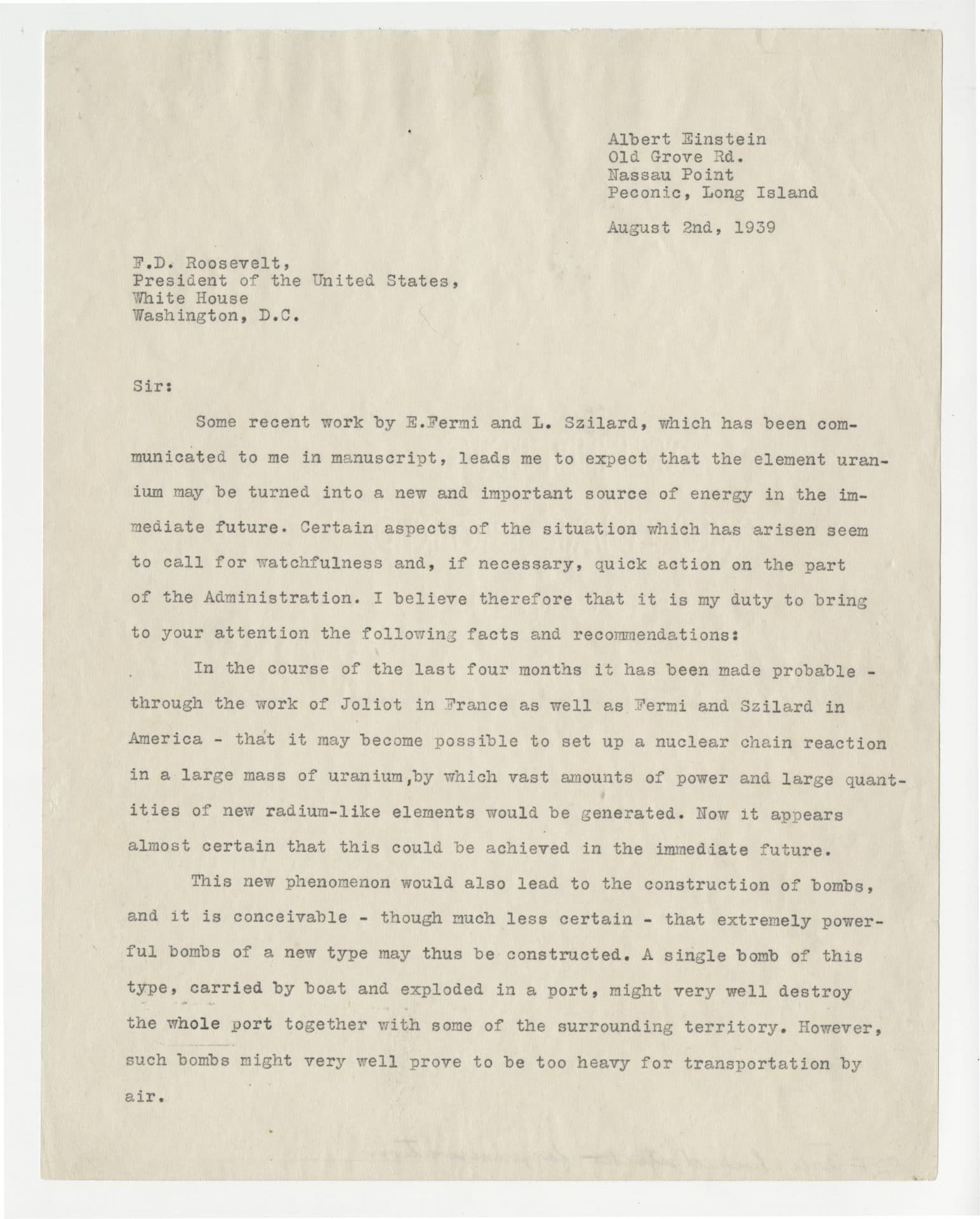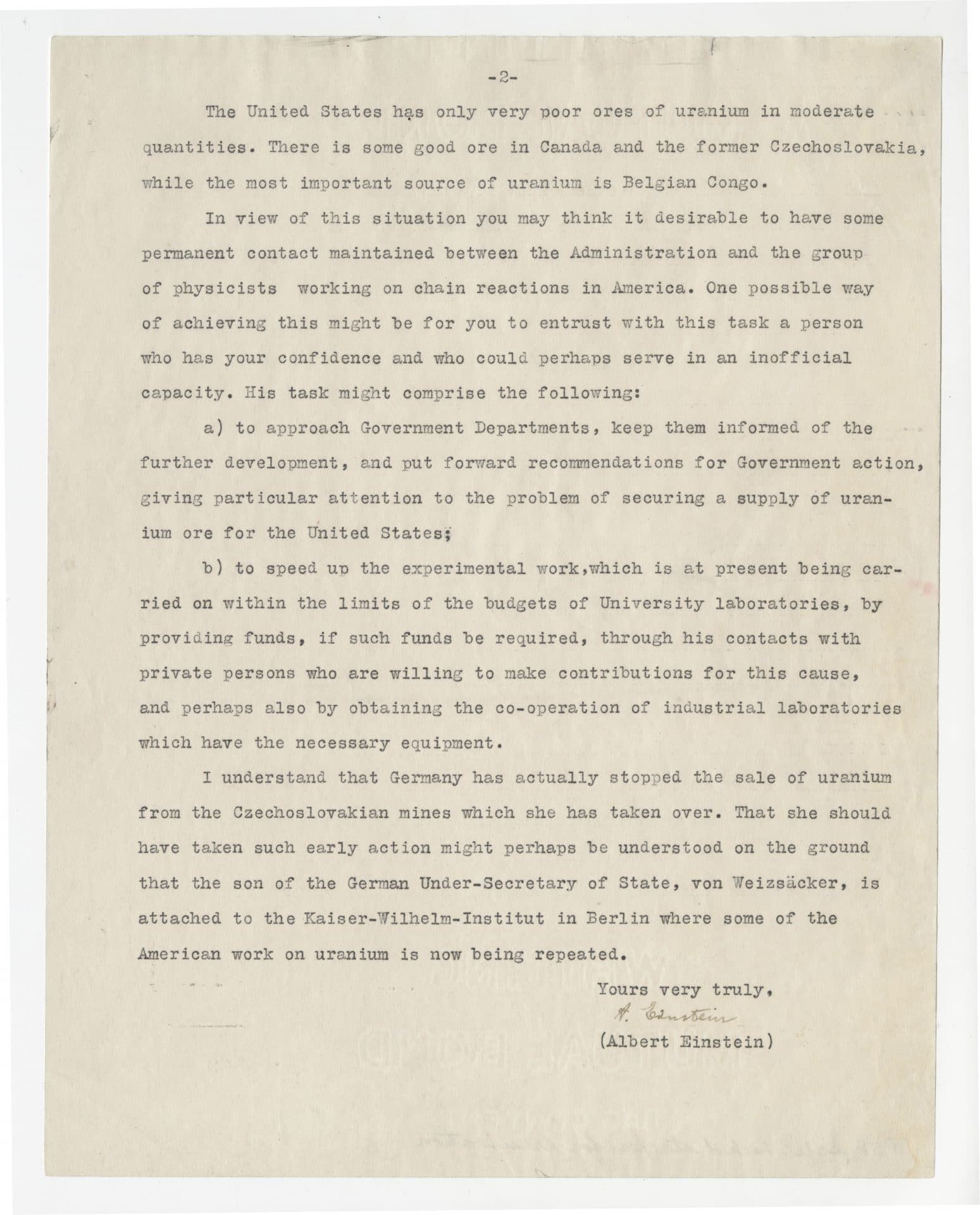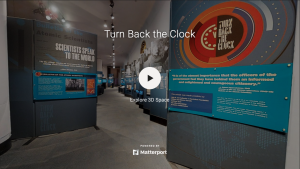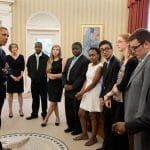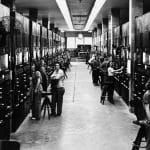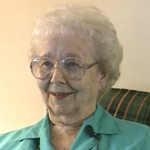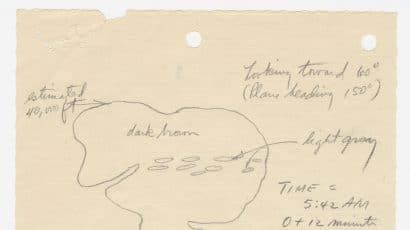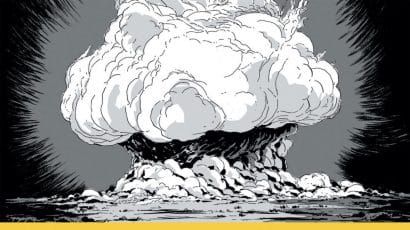Virtual Tour: Turn Back the Clock
Albert Einstein, Leó Szilárd and the letter that led to Manhattan Project
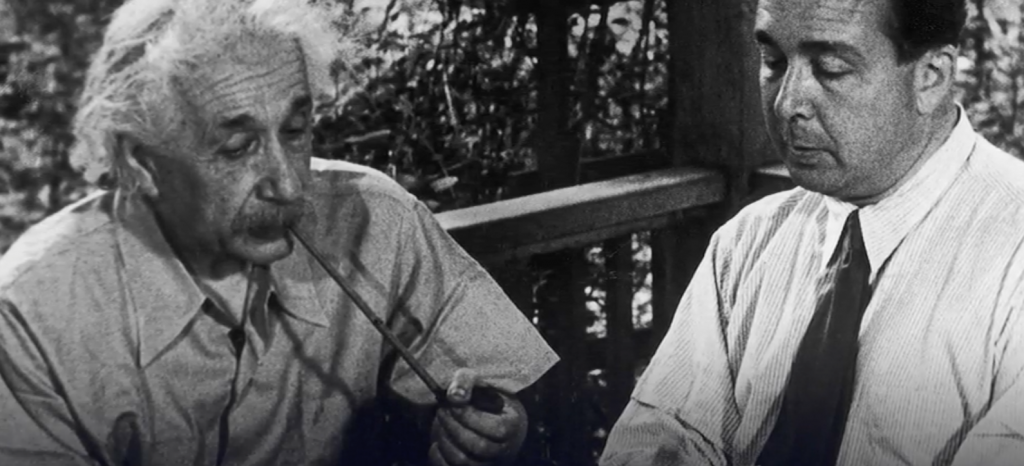 Albert Einstein (left) and Leó Szilárd (right) together in 1946.
Albert Einstein (left) and Leó Szilárd (right) together in 1946.
In August of 1939, Albert Einstein sent a letter to U.S. President Franklin Delano Roosevelt, advising him that the process of nuclear fission could potentially be used to create a powerful atomic bomb.
The letter, often called the Einstein-Szilárd letter, was written by physicist Leó Szilárd and Einstein in an attempt to warn the president that Nazi Germany may be working on a fission bomb—and that the U.S. should begin work immediately on its own nuclear weapons research.
The letter reads, in part: "A single bomb of this type, carried by boat and exploded in a port, might very well destroy the whole port together with some of the surrounding territory."
The letter would prompt Roosevelt to organize research into what would later become known as the Manhattan Project.
Einstein biographer Walter Isaacson would write: "Contrary to common belief, Einstein knew little about the nuclear particle physics underlying the bomb. On the other hand...Einstein did not merely sign the letter to Roosevelt. He was deeply involved in writing it, revising it, and deciding how to get it to the president."
Einstein would later come to regret the letter he and Szilárd sent to the president.
"Had I known that the Germans would not succeed in producing an atomic bomb," he said, "I would have never lifted a finger."
Read the full text of the letter here and then view the original below:
Albert Einstein
Old Grove Rd.
Nassau Point
Peconic, Long Island
August 2nd, 1939
F.D. Roosevelt,
President of the United States,
White House
Washington, D.C.
Sir:
Some recent work by E. Fermi and L. Szilard, which has been communicated to me in manuscript, leads me to expect that the element uranium may be turned into a new and important source of energy in the immediate future. Certain aspects of the situation which has arisen seem to call for watchfulness and, if necessary, quick action on the part of the Administration. I believe therefore that it is my duty to bring to your attention the following facts and recommendations:
In the course of the last four months it has been made probable—through the work of Joliot in France as well as Fermi and Szilard in America—that it may become possible to set up a nuclear chain reaction in a large mass of uranium by which vast amounts of power and large quantities of new radium-like elements would be generated. Now it appears almost certain that this could be achieved in the immediate future.
This phenomenon would also lead to the construction of bombs, and it is conceivable—though much less certain—that extremely powerful bombs of a new type may thus be constructed. A single bomb of this type, carried by boat and exploded in a port, might very well destroy the whole port together with some of the surrounding territory. However, such bombs might very well prove to be too heavy for transportation by air.
The United States has only very poor ores of uranium in moderate quantities. There is some good ore in Canada and the former Czechoslovakia, while the most important source of uranium is Belgian Congo.
In view of this situation you may think it desirable to have some permanent contact maintained between the Administration and the group of physicists working on chain reactions in America. One possible way of achieving this might be for you to entrust with this task a person who has your confidence and who could perhaps serve in an inofficial capacity. His task might comprise the following:
a) to approach Government Departments, keep them informed of the further development, and put forward recommendations for Government action, giving particular attention to the problem of securing a supply of uranium ore for the United States.
b) to speed up the experimental work, which is at present being carried on within the limits of the budgets of University laboratories, by providing funds, if such funds be required, through his contacts with private persons who are willing to make contributions for this cause, and perhaps also by obtaining the co-operation of industrial laboratories which have the necessary equipment.
I understand that Germany has actually stopped the sale of uranium from the Czechoslovakian mines which she has taken over. That she should have taken such early action might perhaps be understood on the ground that the son of the German Under-Secretary of State, von Weizsäcker, is attached to the Kaiser-Wilhelm-Institut in Berlin where some of the American work on uranium is now being repeated.
Yours very truly,
Albert Einstein
This artifact is featured in our virtual Turn Back the Clock tour. Take the tour to learn more about the history of the Doomsday Clock and discover how you, today, can help “turn back the Clock.” Start here.
Together, we make the world safer.
The Bulletin elevates expert voices above the noise. But as an independent nonprofit organization, our operations depend on the support of readers like you. Help us continue to deliver quality journalism that holds leaders accountable. Your support of our work at any level is important. In return, we promise our coverage will be understandable, influential, vigilant, solution-oriented, and fair-minded. Together we can make a difference.
Keywords: Albert Einstein, Leo Szilard, Manhattan Project, Virtual Tour
Take the virtual tour
This artifact is featured in our virtual Turn Back the Clock tour, based on an all-ages exhibit presented by the Bulletin at the Museum of Science and Industry from 2017 to 2019. Enter the tour to learn more about the history of the Doomsday Clock and what it says about evolving threats to humanity. See why Doomsday Clock matters more than ever and discover how you, today, can help “turn back the Clock.”
